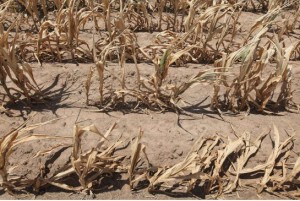It’s here: The big, ugly water bill
 (Updated 5/3/2017: SB 1392 continues to be pending in committee.)
(Updated 5/3/2017: SB 1392 continues to be pending in committee.)
We’re been warning you about it, and now it’s here … SB 1392.
SB 1392 has so many bad provisions that it’s hard to know where to start, but here are a few of them:
- The bill abolishes the requirement that groundwater conservation districts balance production (i.e. pumping) with conservation. Instead, the bill establishes pumping and exporting groundwater as a priority for the state and for the so-called “groundwater conservation districts” (whose ability to conserve groundwater will be effectively abolished).
- It prevents groundwater conservation districts from considering the socioeconomic impacts of the “desired future conditions” they set (DFCs are how much they plan to drain the aquifer). The bill effectively pretends that drawing down our aquifers – which is nothing more or less than mining this vital resource – doesn’t have social and economic impacts on the communities that live above them.
- It removes the public interest in conserving and protecting groundwater from the districts’ list of factors to consider.
Where will this bill leave us? Pump groundwater, ship it around the state to the highest bidder, and hope that some technology appears that saves us from a disaster before the aquifers are completely drained. And in the meantime, don’t worry about destroying rural communities, including the farms that supply our local food.
SB 1392 has been scheduled for a committee hearing on April 10, and the Committee Chair, Senator Charles Perry, is also author of the bill. It is extremely difficult to stop a Chairman’s bill from moving forward, as you saw last month when we tried to stop Perry’s bad seed and sprays bill. But, with your help, we succeeded in stopping his massive water transfer bill last session, in 2015. Together, we can do it again.
TAKE ACTION #1: Come to the hearing
(NOTE: As of 5/3/2017, SB 1392 remains pending in committee. Thank you to all who attended the hearing or registered as witnesses!)
Can you come to the Capitol for just 15 minutes on Monday afternoon, April 10, between 1 p.m. and 5 p.m.? That’s all the time it takes to register in opposition to a bill – and it truly makes a difference. The Senators look at the witness list, both in committee and on the floor, to see how many people supported or opposed the bill.
You don’t have to stay and testify in order to be listed as a witness – you just have to be at the Capitol in person for that brief window of time in order to register. See the details on how to register, below.
As an added bonus, if you come to the Capitol to register against SB 1392, you’ll also have the opportunity to register in support of one of the few good water bills that is being heard this session, HB 3166. This bill requires the Texas Water Development Board to determine the maximum amount of groundwater that can be pumped from each aquifer in perpetuity — a vital piece of information that needs to be addressed!
TAKE ACTION #2: Call your Senator
 Call or email your State Senator and urge him or her to oppose SB 1392.
Call or email your State Senator and urge him or her to oppose SB 1392.
Remember that calls have the greatest impact! They can be very short, just a couple of minutes – but they are invaluable in making it clear that this issue is important to you.
You can find out who your State Senator is by going to www.fyi.legis.state.tx.us or calling the Texas Capitol Switchboard at 512-463-4630.
Sample text:
“Hi, my name is ___, and I am a constituent. I am calling to urge Senator ____ to OPPOSE SB 1392. Water is not simply a commodity like any other. Water is a necessity for life, and for all economic activity. Groundwater conservation districts need to continue to prioritize conservation. The public’s interest in this vital resource needs to be considered, as do the social and economic impacts on the communities living above the aquifers. I urge my Senator to oppose SB 1392.”
If you send an email, be sure to personalize it by explaining why this issue is important to you. You can also check out the “More Information” section below for additional issues with the bill.
COMMITTEE HEARING DETAILS
WHERE: Room E1.012 This is on Floor E1 of the Capitol Extension. (View map here)
WHEN: Monday, April 10, 2017
TIME: 2 p.m. or upon adjournment of the Senate. This means that we don’t know when the hearing will actually start — most likely, late afternoon. The witness registration kiosks typically open one hour before the scheduled time, so you can register your opposition to the bills starting at 1 p.m..; the registration will stay open until the bills actually are heard.
PARKING: Parking is usually available at the Capitol Visitors Center, located between Trinity and San Jacinto Streets at 12th and 13th. (You can find a map and other options also listed here)
WHAT TO DO: Arrive at the Capitol between 1 and 5 p.m. (and possibly later — watch our Facebook page for updates), and register in opposition to SB 1392.
You’ll be listed on the witness list even if you leave right after that. The Senators’ list is important because when the bill goes to the full Senate after the hearing, the Representatives will look to see how many people were witnesses for or against the bill. Just 15 minutes can have an impact!
SIGNING IN: The Texas Legislature uses electronic witness affirmation forms which are available at registration kiosks located throughout the Capitol Extension. Take the elevator down to Floor E1, and walk down the main hallway about halfway. Turn right, down one of the side hallways, then turn again so that you are going parallel to the main hallway. You’ll see alcoves, where pay phones previously were located — the kiosks are in there. (The right side holds kiosks for Senate registration – the left side is for House hearings.)
Be sure to take this information with you:
The bill number: SB 1392
The committee: Senate Agriculture, Water & Rural Affairs Committee
The time and location of the hearing: 2 p.m., Room E1.012
Position: AGAINST the bill.
Not Testifying (unless you have a specific story or concern that you want to speak about)
To Support the Good Bill
While you’re at the Capitol, you can also sign in to support HB 3166, which would require the Water Development Board to figure out how much water can actually be pumped from an aquifer in perpetuity — in other words, how much pumping is sustainable.
You will have to use 2 different kiosks — the kiosks on the east side of the building are for Senate hearings, and the kiosks on the west side of the building are for House hearings. If you want to testify at the hearing on HB 3166 (in addition to registering support), exit the Capitol through the north exit, and the JHR (John H. Reagan) building is on your left. MAP
The bill number: HB 3166 by Lucio III
The committee: House Natural Resources S/C on Special Water Districts
The time and location of the hearing: 2 p.m., Room JHR 140
Position: FOR the bill
Not testifying (unless you have a specific story or concern that you want to speak about)
You can read the full text of SB 1392 here
Local groundwater conservation districts, or GCDs, have been the state’s preferred method for managing our groundwater resources for decades. SB 1392 would dramatically change their mission and their powers, effectively gutting their ability to protect groundwater resources for local communities and future generations.
Here are some of the key problems with the bill:
- It amends the current directive that GCDs “balance the conservation and development of groundwater” to say instead, “balance the conservation and provide for the orderly development of groundwater.” Not only is this a nonsensical statement (what is conservation now being balanced with?!), but it fundamentally changes GCDs’ mission.
- It requires local districts that overlie a single aquifer to have “common rules,” but does not address how that would happen. The most likely outcome is that a local GCD that tries to prioritize protection of the aquifer, and doesn’t allow as much pumping as its neighbors, would simply be outvoted and find its rules overridden.
- It takes out key factors that the GCDs are supposed to consider in adopting rules:
- GCDs would no longer consider “all groundwater uses and needs.”
- GCDs would no longer consider the “public interest in conservation, preservation, protection, recharging, and prevention of waste of groundwater” … the very elements that the Texas Constitution identifies as important!
- GCDs would no longer even be able to consider whether the groundwater would be used inside or outside of the district, even though exporting groundwater has impacts on both aquifer recharge and the community.
- In setting the desired future conditions (DFCs), which are essentially how much the aquifer will be drawn down or mined, the districts would no longer be able to consider:
- Whether there were substantial differences in the aquifer uses or conditions from one geographic area to another.
- The socioeconomic impacts reasonably expected to occur.
- The prohibition on considering the impacts on exporting groundwater out of the district is reinforced by this new language: “The right to export groundwater is of equal dignity with the right to produce groundwater.” So even if the export would mean more damage to the aquifer, or severe harm to the local community, it simply won’t matter.
- To add insult to injury, the bill also removes the ability of a district to use fees on exported groundwater for aquifer recharge, conservation measures, or even a program to mitigate the damages caused by the export.
This bill sacrifices our rural communities, our farms, and our children’s future in order to satisfy the interests of developers and water marketers who want unrestrained urban growth without having to worry about annoying conservation measures.
Help us stop SB 1392! Call or email your Senators today, and stay tuned for more action items.
